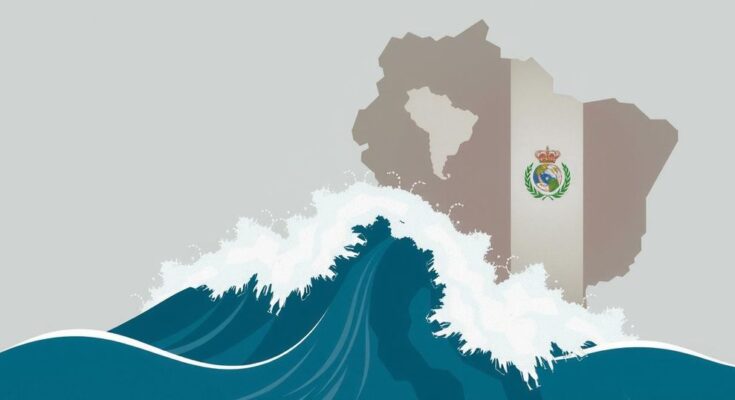Bolivia and Peru are experiencing a significant surge in COVID-19 cases, with numerous deaths reported amid systemic healthcare failures. Official counts likely underestimate the situation due to inadequate testing and government inaction. Both countries have faced immense challenges during the pandemic, highlighting the critical need for proactive public health policies. Experts warn against downplaying COVID-19’s risks as officials shift responsibility to the public.
Peru and Bolivia are currently experiencing a notable surge in COVID-19 cases, illustrating the ongoing risks posed by new variants globally. Within the first week of January 2025, Bolivia recorded 457 COVID-19 cases, with four reported deaths. Meanwhile, Peru’s El Comercio noted five fatalities in the past three weeks, primarily affecting older adults. These figures are likely higher due to inadequate testing and governmental apathy, highlighting the critical situation despite the official numbers.
The COVID-19 pandemic has critically exposed the frailties of healthcare systems in Bolivia, Peru, and the broader region, marking them as some of the most deficient worldwide. BBC News Mundo reported nearly 15 million official deaths globally, with the true toll likely nearing 30 million, particularly affecting Latin America, which has suffered the highest excess mortality rates.
Peru and Bolivia have the highest confirmed death rates globally from COVID-19. By March 2022, Peru registered over 3.5 million cases and 211,944 deaths, equating to approximately 5,735 deaths per million. Bolivia’s excess mortality reached an alarming estimate of 735 deaths per 100,000 people, contrasting sharply with the global average of 120, emphasizing severe healthcare inadequacies.
The onset of the pandemic in 2020 revealed significant weaknesses in Peru’s health system, which had only one ICU bed per 100,000 people versus the OECD recommendation of twelve. Bolivia faced similar challenges, with its health infrastructure nearly collapsing, leading to overwhelming death tolls and insufficient capacity to treat patients.
As of 2025, Bolivian authorities report a resurgence of cases, with 369 new infections noted in Santa Cruz and 45 in Cochabamba within the first epidemiological week. Health Ministry officials raised concerns about low vaccination uptake, attributing this lack of action to the government’s premature declaration of the pandemic being over and insufficient public health policies.
The government of Bolivia has downplayed the continuing threat of COVID-19, designating it as merely another circulating virus. Additionally, the administration has inadequately shifted the blame for renewed infections onto the responsibilities of the population. Measures taken, such as deploying a few mobile hospitals, do not sufficiently address the rising crisis.
Peru faces a parallel situation, where government corruption and apathy contribute to the crisis. Health Minister César Vásquez Sánchez distanced the Ministry of Health from accountability for rising cases and deaths, attributing these to seasonal respiratory infections rather than recognizing the severity of COVID-19.
Experts challenge the prevailing narrative that COVID-19 is becoming milder, emphasizing that the virus may mutate unpredictably. Despite scientific warnings about potential mutations leading to more significant risks, authorities in both Bolivia and Peru underestimate COVID-19’s dangers, persisting with inadequate healthcare strategies that echo capitalist profit motives above public health.
The ongoing COVID-19 crisis in Bolivia and Peru is a manifestation of a broader failure to confront the pandemic seriously, driven by a policy of merely coexisting with the virus. Historical precedents demonstrate the disastrous impacts of such a strategy, particularly under former Brazilian President Jair Bolsonaro’s rule during the pandemic.
Thus, the situation calls for a reevaluation of public health policies and significant investment in healthcare infrastructure and research rather than weaponry. Advocates argue for the establishment of a healthcare system driven by collective needs, distancing it from profit-driven motives, thereby ensuring a more robust response to future health crises.
The COVID-19 pandemic has revealed significant weaknesses in healthcare systems throughout South America, particularly in Bolivia and Peru. Since 2020, these countries have experienced some of the highest death rates in the world due to COVID-19, attributed to a confluence of inadequate health infrastructure, governmental negligence, and an overarching pro-business healthcare approach that prioritizes profitability over health outcomes. As new variants emerge and cases surge again, there is a pressing need for reevaluating public health strategies and addressing the systemic failures that have exacerbated the crisis.
The resurgence of COVID-19 cases in Bolivia and Peru serves as a stark reminder of the ongoing global health crisis and the failures of current government policies. Both nations face severe challenges in managing healthcare responses, largely due to systemic weaknesses and corruption. It is imperative to prioritize public health over profits, ensuring that healthcare infrastructure is equipped to handle future waves of infections. A more responsibly structured healthcare approach must be in place to protect citizens and address this continuing threat.
Original Source: www.wsws.org




